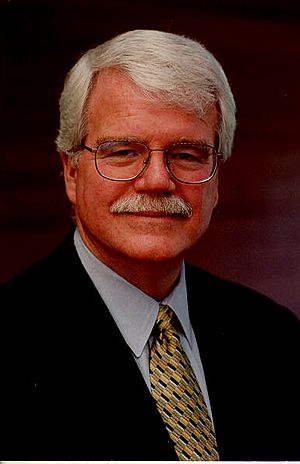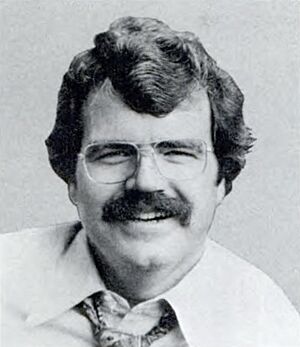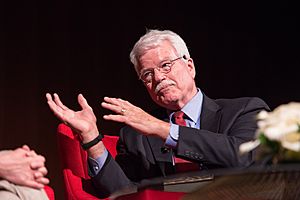George Miller (California politician) facts for kids
Quick facts for kids
George Miller
|
|
|---|---|
 |
|
| Chair of the House Education Committee | |
| In office January 3, 2007 – January 3, 2011 |
|
| Preceded by | Buck McKeon |
| Succeeded by | John Kline |
| Chair of the House Natural Resources Committee | |
| In office May 4, 1991 – January 3, 1995 |
|
| Preceded by | Mo Udall |
| Succeeded by | Don Young |
| Member of the U.S. House of Representatives from California |
|
| In office January 3, 1975 – January 3, 2015 |
|
| Preceded by | Jerome Waldie |
| Succeeded by | Mark DeSaulnier |
| Constituency | 7th district (1975–2013) 11th district (2013–2015) |
| Personal details | |
| Born | May 17, 1945 Richmond, California, U.S. |
| Political party | Democratic |
| Spouse | Cynthia Caccavo |
| Children | 2 |
| Parent | George Miller Jr. (father) |
| Education | Diablo Valley College San Francisco State University (BA) University of California, Davis (JD) |
George Miller III (born May 17, 1945) is an American politician who served in the United States House of Representatives for 40 years, from 1975 to 2015. As a member of the Democratic Party, he represented two different districts in California during his long career.
Miller was known for being a leader on important issues. He was the chairman of the House Natural Resources Committee, where he worked to protect the environment. He also led the House Education and Labor Committee, focusing on schools and workers' rights.
Contents
Early Life and Education
George Miller was born in Richmond, California. His father, George Miller Jr., was also a well-known politician in California. Following in his father's footsteps, George became interested in politics from a young age.
He went to Diablo Valley Community College and later graduated from San Francisco State University. After his father passed away in 1969, Miller ran for his father's seat in the California State Senate but did not win. He then decided to continue his education and earned a law degree from the University of California, Davis School of Law. Before being elected to Congress, he worked as an assistant to California State Senate Majority Leader George Moscone.
A Long Career in Congress
In 1974, at the age of 29, Miller was elected to the U.S. House of Representatives. He was one of many new, young Democrats elected that year who wanted to bring change to Washington, D.C. He would go on to be reelected 18 times, serving for a total of four decades.
Miller was known for being a strong liberal voice in Congress. He was passionate about his beliefs and was skilled at debating and passing laws. He spent more than half his life serving as a representative for the people of California.
Working on Important Issues
Throughout his career, Miller focused on several key areas. He was a leader in creating laws and policies that affected the environment, education, and the rights of workers.
Protecting the Environment
As chairman of the Natural Resources Committee, Miller played a big part in protecting wild places. He helped pass the 1994 California Desert Protection Act. This law created Death Valley National Park and Joshua Tree National Park, protecting them for future generations.
He also sponsored a law in 1992 to protect fish and wildlife in California's Bay-Delta region, an important water source. He remained a key member of the committee for many years, always fighting for conservation.
Fighting for Workers and Students
Miller was also a leader on the Education and Labor Committee. He helped write the No Child Left Behind Act, a major law aimed at improving schools. He fought against cuts to student aid for college and worked to make sure schools had the money they needed.
He was a strong supporter of workers' rights. In 2007, he sponsored the Fair Minimum Wage Act of 2007, which raised the minimum wage for workers across the country. He also spoke out to make sure factories in other countries had safe conditions for their workers.
The Port Chicago Disaster
Miller worked for many years to correct a historical injustice known as the Port Chicago disaster. During World War II, an explosion at a naval base killed hundreds of sailors, most of whom were Black. When the surviving Black sailors refused to go back to the dangerous work of loading ammunition, 50 were wrongly convicted of mutiny (disobeying orders).
Miller pushed to have their names cleared. In 1999, President Bill Clinton pardoned one of the last living sailors, Freddie Meeks, thanks to Miller's efforts. Miller also wrote the law that made the Port Chicago site a National Memorial to honor those who died.
Supporting Native American Rights
Miller was a strong supporter of Native American gaming, which allows tribes to run casinos on their land to support their communities. In 1993, when future president Donald Trump questioned whether some tribe members were truly Native American, Miller spoke out strongly against him in a congressional hearing. He said that a person's appearance should never be a test of their rights in the United States.
A Close Friendship in Politics
In Washington, D.C., Miller was known for his close friendship and working relationship with Nancy Pelosi, who would later become the Speaker of the House. They represented neighboring districts in California and often traveled together.
Miller was considered one of Pelosi's most trusted advisors. He helped her develop the Democratic Party's plans and supported her leadership. Their long friendship was a powerful partnership in Congress.
Personal Life
For many years, Miller owned a house in Washington, D.C., where he rented rooms to other members of Congress. His housemates included Nancy Pelosi and Senators Chuck Schumer and Dick Durbin. This house became a famous gathering spot for these powerful politicians. Miller bought the house in 1977 and sold it when he retired in 2015.



